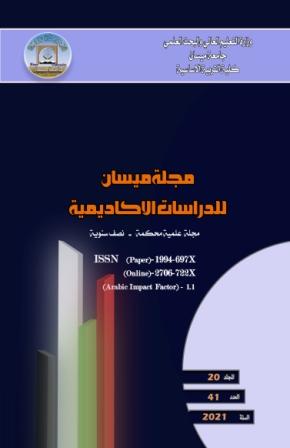Study the inhibitory effects of aqueous and alcoholic extracts of Melia azedarach L. on some bacterial strain.
Abstract
The current study aimed to preparation of an aqueous and alcoholic extracts of Melia azedarach L.leaves .The antimicrobial activity of these extracts was tested against four strains of bacterial isolates, two of them were Gram-positive, namely Staphyloccocus aureus NCTC6571 standard strain and Staphyloccocus aureus strain from some clinical patients. And other were Gram-negative, namely Escherichia coli ATCC25922 a standard strain and Pseuedomonas aeroginosa clinical strain isolated from some patients. Drug sensitivity test to clinical strains was also tested toward Psuedomonas aeroginosa , Staphyloccocus aureus) to Ciproflaoxacin, Cefoxitin , Strepomycin , Cefoxitin . The clinical bacterial strain Pseuedomonas aeroginosa showed resistance 100% to all antibiotics used in the experiment, while the Staphyloccocus aureus was sensitive to four antibiotics: Ampicillin, Ciproflaoxacin, Ampicillin, and Strepomycin.
The current study showed the superiority of the alcoholic extract in
inhibiting standard and clinical strains, including antibiotic resistance, while the aqueous extract did not show an
inhibitory activity against any of the clinical bacterial, and cytotoxicity was tested using human red blood cells(RBC) , where the results showed the absence of any Cellular toxicity for all concentrations used in the experiment, so the current study recommends the possibility of using the alcoholic extract of the rosary plant as drug alternatives after conducting cytotoxicity tests and drug dose (LD50) on the mentioned extract.
Downloads
The copyright is also the copyright of the magazine only.
All articles published in our magazine are subject to license terms
Creative Commons Attribution(CC BY-NC-ND 4.0) This license permits the content to be reproduced, redistributed and reused in whole or in part for any purpose free of charge, without any permission from the author(s), researcher or student.
Works submitted to Maysan Journal of Academic Studies for publication in the journal (CC BY-NC-ND 4.0) license terms. Where available content can be shared, distributed and replicated provided there is no commercial profit and appropriate credit must be given to the original source through sources or citations. It is mandatory to review any material used from other sources including shapes, tables, and images for re-use under the terms of the Creative Commons License (CC BY-NC-ND 4.0).Provided that there is no modification to the original content



